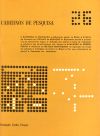Influência de características do aluno na avaliação do seu desempenho
Keywords:
Diferenças sexuais, Avaliação da aprendizagem, DesempenhoAbstract
Entre as características do aluno que podem influir na avaliação do seu desempenho, interessa-nos particularmente o sexo. Isto porque investigações recentes a respeito de diferenças sexuais na escola (Rosemberg, 1975) e da participação e desempenho de moças e rapazes nos exames vestibulares ( Barroso e Mello, 1975), contestam que: A) Moças encaminham-se em sua maioria para carreiras tradicionalmente feminina B) De um modo geral os rapazes tendem a obter maior sucesso que as moças no vestibular, independente da carreira escolha; o desempenho das moças é inferior ao dos rapazes nas disciplinas de ciências exatas (física, química e biologia) e matemática, sendo igual ou superior nas disciplinas de maior conteúdo verbal, como português e inglês; C) No ensino médio (1º e 2º graus), as meninas tendem a obter notas mais altas que os meninos, são reprovados com menor freqüência e apresentam menores atrasos de escolaridade.Downloads
Downloads
Published
How to Cite
Issue
Section
License
Copyright (c) 1978 Cadernos de Pesquisa

This work is licensed under a Creative Commons Attribution-NonCommercial 4.0 International License.
Authors who publish in this journal agree to the following terms:
a. Authors retain the copyright and grant the journal the right to first publication, with the paper simultaneously licensed under the Creative Commons Attribution license that allows the sharing of the paper with acknowledgment of authorship and initial publication in this journal.
b. Authors are authorized to assume additional contracts separately, for non-exclusive distribution of the version of the paper published in this journal (for example publishing in institutional repository or as a book chapter), with acknowledgment of authorship and initial publication in this journal.
c. Authors are allowed and encouraged to publish and distribute their paper on-line (for example in institutional repositories or on their personal page) at any moment before or during the editorial process, as this can generate productive changes, as well as increase the impact and citation of the published paper (See The Effect of Open Access).









